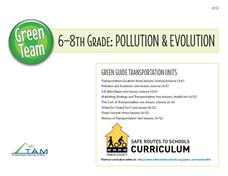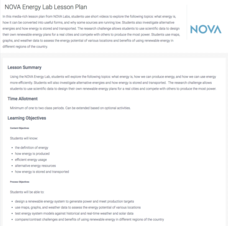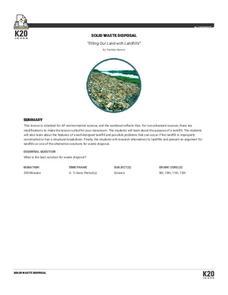NOAA
Deep-Sea Corals
Come take a peak at the corals in the deep. Science scholars discover the hidden world of deep-sea corals in the third installment of a 13-part series. Topics include the differences between shallow water and deep-sea corals, the slow...
NOAA
Deep-Sea Benthos
Much like a distant planet, the underwater world of deep-sea benthos is strange and largely unknown. How do creatures survive and thrive in such extreme pressure and temperature conditions? Young oceanographers join the crew of Operation...
NASA
Wetlands
Take a little wade in the wetlands. A fun unit has pupils conduct a literature review to learn how climate change and human actions affect wetland ecosystems. They take a trip to a wetland, observe the fauna and flora, and then take and...
NASA
The Big Climate Change Experiment Lesson 1: Pre-Exploration
Most have heard of climate change, but what does it really mean? Scholars first answer a set of pre-assessment questions about climate change to help instructors gauge how much they know. They listen to a video lecture, watch a news...
Safe Routes to School
Pollution & Evolution
Bring together a study of two major scientific topics with a lesson on the relationship between pollution and evolution. With the help of a PowerPoint presentation, hands-on activity. and class demonstration young scientists learn how...
Seussville
What Can Your Class Do?
Inspire scholars to do their part for planet Earth with a read-aloud of Dr. Seuss's The Lorax, and variety of activities designed to boost the environmental activist in us all. Activities include writing poems about the Earth, sorting...
WE Charity
High School–Module 3: Food Waste
Advances in packaging and refrigeration help keep food fresher longer. That's just one of the ways science is addressing global food waste. With the third of five lessons from the WE Are Innovators—High School Modules set, scholars use...
PBS
NOVA Energy Lab Lesson Plan
Can our energy resources keep up with our ever-growing population? Science scholars learn the basics of energy and Earth's energy resources during an electrifying lesson. The resource combines video clips and an engineering design...
Curated OER
Indigenous Peoples’ Day Lesson Plan
Indigenous Land Guardianship, Settler Colonialism, Racial Capitalism. While the terms may be new to some, they feature in a lesson plan designed for Indigenous Peoples' Day. Young scholars investigate four concepts: Land...
Global Oneness Project
The Value of Ancient Traditions
Imagine having to give up cell phones, computers, and TV? What would be lost? What gained? An examination of the Drokpa, a nomadic people who live in the grasslands of Tibet, provides class members an opportunity to consider how access...
Wild BC
Is Climate Change Good for Us?
Is it really that big of a deal if the global climate undergoes a little change? Young environmentalists consider this very question as they discuss in small groups the impact of different climate change scenarios on their lives, their...
Science Matters
Island Fox Outreach
Off the coast of California lives a wild animal called the Island Fox. Experts discuss the importance of the Island Fox to the Channel Islands and the balance the fox creates within its ecosystem. The lesson concludes with a reading of...
K20 Learn
Filling Our Land with Landfills: Solid Waste Disposal
New ReviewThough it comprises only 5 percent of the world's population, the US generates 40 percent of the world's waste. Scholars learn about landfills, their safety, and other solid waste methods. They use experiments and research to learn more....
Chicago Botanic Garden
Calculating Your Carbon Footprint
Unplugging from technology for one day per week will decrease your carbon footprint—are you up to the challenge? Part two in a series of three allows individuals to explore their personal carbon footprints. By first taking a quiz at home...
Kenan Fellows
Making Connections with Water Quality
What's in your water? And, why is water quality so important? Enhance your class's level of water appreciation through a lesson that demonstrates the necessity of water quality. Environmental enthusiasts explore the EPA's Clean Water...
Environmental Protection Agency (EPA)
Happy Earth Day Coloring Book
From turning off lights when leaving a room, to biking or walking to school, there are many simple habits children can develop to help preserve the earth. Help raise environmental awareness in your class with this activity packet that...
Polar Bears International
Taking Action!
Motivate young scientists to stand up and take action with this environmental science lesson. To begin, the class works in small groups brainstorming actions that support the conservation of the earth before creating and implementing an...
Teach Engineering
An Introduction to Air Quality Research
Viewers are a PowerPoint are exposed to the idea that pollutants are in more than just the air we breathe. the presentation provides information about the layers of the earth's atmosphere and takes a look at the pollutants in the...
Seussville
The Lorax's Earth Day
Add a touch of Dr. Seuss whimsy to your Earth Day celebration with six pages consisting of Earth-friendly, inspiring, and engaging activities designed to enhance the beauty of your school campus and showcase the famous story, The Lorax.
CK-12 Foundation
Limiting Factors to Population Growth: Graphing Population Growth
If any of the limiting factors in an environment change, both animal and plant populations also change. The video explains two different models of growth and the impact of limiting factors. It highlights the carrying capacity of an...
Curated OER
Bottled Water Ban
Convenience, taste, portability ... what's not to love about bottled water? Apparently, a lot. Scholars analyze the four main arguments supporting and opposing the sale of bottled water. They explore the health, environmental, and...
Channel Islands Film
Santa Cruz Island - Visible Thinking Routines
Visible Thinking Routines are designed to help learners deepen their understanding of what they are learning and enable them to communicate their understanding of concepts to others. Individuals adopt one of these routines to use to...
NPR
Define the Plastic Problem
Individuals identify a specific problem concerning plastics and write a problem statement, which describes the problem, explains why it's a problem, and identifies desired solutions.
WE Charity
High School–Module 4: Energy and Housing
What features make a home energy-efficient? Pupils attempt to answer the question with the fourth lesson plan from the five-part WE Are Innovators—High School Modules set. Scholars learn how certain building materials help save energy....

























